Bullying in schoolspublished at 11:48 BST 29 March 2018
Tory MSP Brian Whittle asks about action to ensure that, in instances of bullying, schools act to protect both parties and ensure that the school environment remains a safe place.
The Social Security Committee takes evidence on the new social security tribunal proposal
Opposition party leaders and MSPs quiz Nicola Sturgeon during first minister's questions
A members' debate marks Scottish Apprenticeship Week
Equalities secretary gives statement on plan to tackle child poverty
MSPs debate safeguarding cultural heritage
Craig Hutchison and Louise Wilson
Tory MSP Brian Whittle asks about action to ensure that, in instances of bullying, schools act to protect both parties and ensure that the school environment remains a safe place.
Housing Minister Kevin Stewart says local authorities are required to ensure housing is wind- and water-tight, and fit for human habitation.
Registered social landlords must also ensure housing complies with housing standards, he adds.
 Image source, bbc
Image source, bbcSNP MSP Angus Macdonald
Local authorities can use their powers to ensure people have a right to essential repairs, the minister states.
Mr MacDonald says some local authorities are hesitant to use the missing shares powers and asks what can be done to ensure them to make use of them.
It is for local authorities to decide how best to make use of their powers but they are being encouraged to share best practice through the Scottish Housing Network, Mr Stewart says.
SNP MSP Angus MacDonald inquires about protecting the rights of council tenants who are in a minority position regarding essential communal repairs.
 Image source, bbc
Image source, bbcHousing Minister Kevin Stewart
Housing Minister Kevin Stewart says discussions are ongoing between all stakeholders.
Housing recommendations published earlier this month include how to provide support for those with complex needs, such as mental health or addiction, he says.
Mr Mason suggests there needs to be a change in regulations to improve homeless hostels.
Mr Stewart says the Bellgrove Hotel is not typical of homeless accommodation and says a change in regulations is therefore unlikely to have a huge impact.
The solution to the problems at Bellgrove must be part of a wider effort to tackle homelessness in Glasgow, he adds.
MSPs propose plan based on Finnish scheme to tackle homelessness
More should be done to find permanent accommodation for the homeless, a Holyrood committee has said.
The MSPs said Scotland should adopt a "housing first" scheme, similar to a strategy used successfully in Finland.
The Local Government and Communities Committee said the plan, which has been piloted in parts of Scotland, should go nationwide.
The housing minister has welcomed the committee's report and said he will consider it carefully.
SNP MSP John Mason asks about discussions between Glasgow City Council, Police Scotland and NHS Greater Glasgow and Clyde regarding the Bellgrove Hotel.
 Image source, Getty Images/PA/BBC
Image source, Getty Images/PA/BBCAllow X content?
This article contains content provided by X. We ask for your permission before anything is loaded, as they may be using cookies and other technologies. You may want to read X’s cookie policy, external and privacy policy, external before accepting. To view this content choose ‘accept and continue’.
 Image source, Scottish Parliament/PA
Image source, Scottish Parliament/PANot long to go now before the final first minister's questions before the Easter recess.
Stay tuned with us for extensive coverage including all the social media reaction as it happens.
First up we have general questions and the lunchtime member's debate celebrates Scottish Apprenticeship Week.
 Image source, Getty Images
Image source, Getty ImagesA ministerial statement on the delivery plan to tackle child poverty will be made a 2.30pm.
MSPs will then debate support for the Convention for the Safeguarding of Intangible Cultural Heritage and the Housing (Amendment) (Scotland) Bill at stage 1.
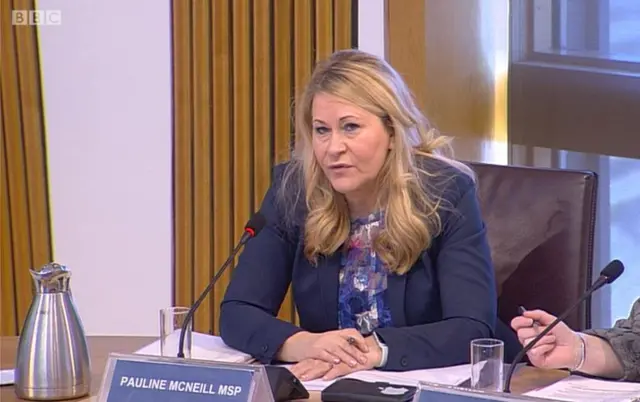
Labour MSP Pauline McNeill
Labour MSP Pauline McNeill queries transparency around tribunals.
Ms Burn says she is a supporter of tribunals being as transparent as possible and suggests it would be helpful to see what a tribunal decisions looks like.
On timing, she says in the vast majority of cases tribunal decisions are made on the day and claimants are given an explanation of the decision and what they can do next.
That concludes the Social Security Committee.
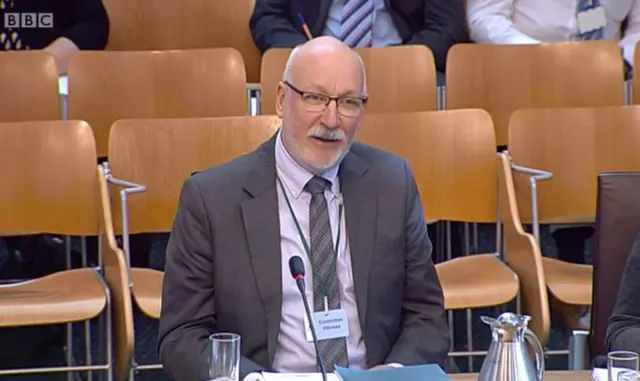 Image source, bbc
Image source, bbcDisability qualified tribunal member Paul Dumbleton
Disability qualified tribunal member Paul Dumbleton says he does have lived experience of being a carer for daughter who has a learning disability and is in receipt of DLA
Mr Dumbleton says he is not convinced that lived experience should be a set criteria.
When devising a new benefits system "people's lived experience should be heard very, very loudly", he says.
He is not so sure the lived experience is so important in tribunals and says he does not support what SAMH are suggesting.
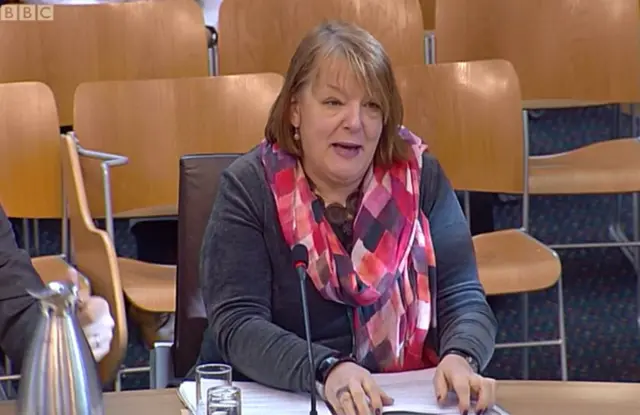 Image source, bbc
Image source, bbcRegional tribunal judge Jessica Burns
Disability qualified tribunal member Paul Dumbleton says very often there is evidence before a tribunal that the decision maker did not see.
Ms McNeill raises a question from SAMH about ordinary members with lived experience being on the tribunal.
Regional tribunal judge Jessica Burns says all members are appointed by the judicial appointments commission.
Ms Burns says the experience of ordinary members may not see them through their entire appointment.
She says there are limits of trying to apply personal experience as a general approach must be adopted.
Dr Patricia Moultrie, a medically qualified tribunal member, says many tribunals adjourn due to a lack of medical evidence and many decisions are overturned because of new medical evidence.
She suggests data extractions from GP records would underpin the evidence base.
Producing computerised extracts would mean additional burdens on GPs would not be huge, she argues.
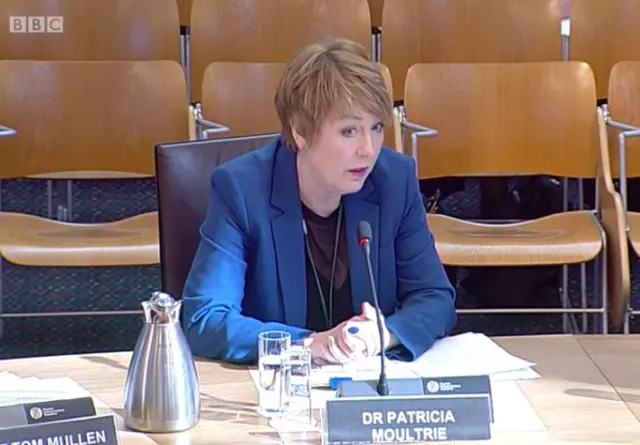
Dr Patricia Moultrie, a medically qualified tribunal member
The current medical assessment process is done in a very routine and formulaic way, regardless of the medical condition a claimant may have, states Dr Moultrie.
This could be improved by making processes more bespoke and having pre-tribunal meetings to discuss this, the witness says.
 Image source, PA
Image source, PAThe establishment of Scotland's devolved social security system is at a "critical point", auditors have said.
Holyrood is taking on responsibility for a range of welfare benefits, to be delivered by a new government agency.
A new Audit Scotland report warned that ministers had "not clearly estimated" the cost of putting powers into practice, urging greater transparency.
Scottish government minister Jeane Freeman said she was "confident" that plans for the agency were on track.
Allow X content?
This article contains content provided by X. We ask for your permission before anything is loaded, as they may be using cookies and other technologies. You may want to read X’s cookie policy, external and privacy policy, external before accepting. To view this content choose ‘accept and continue’.
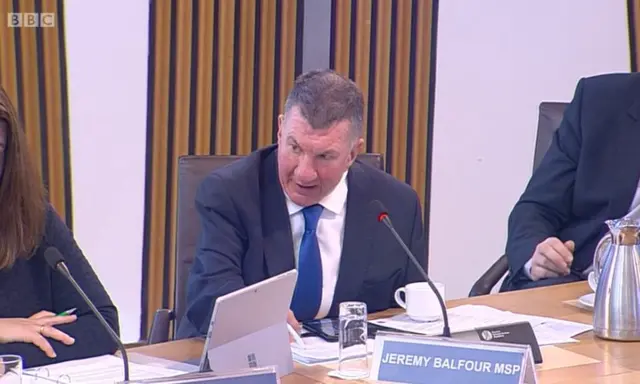
Tory MSP Jeremy Balfour
Tory MSP Jeremy Balfour asks whether the powers relating to expenses are likely to be used often.
Ms Burns says she "hasn't seen the arguments" for these powers and there has been "no demand" from first-tier tribunals for it.
Prof Mullen says one of the barriers to going to court is the fear of having expenses awarded against you.
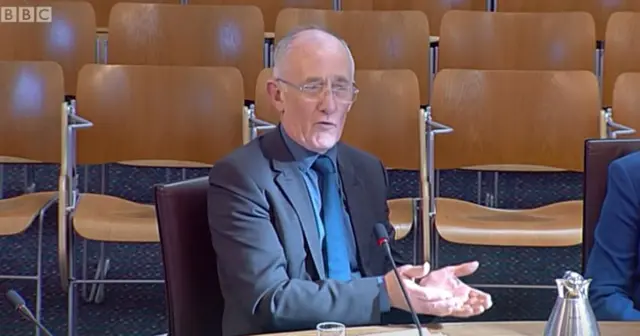 Image source, bbc
Image source, bbcProfessor Tom Mullen
Tory MSP Adam Tomkins says there is support for the social security charter across the political spectrum but raises the issue of potential legal challenges.
Professor Tom Mullen, a member of former Scottish Tribunals & Administrative Justice Advisory Committee, says the tribunal can take account of human rights.
Prof Mullen wonders if this might raise expectations that claimants can raise human ritghts as an argument in tribunals.
He doubts whether the tribunals would be comfortable with that when they work within the regulations to decide entitlement.
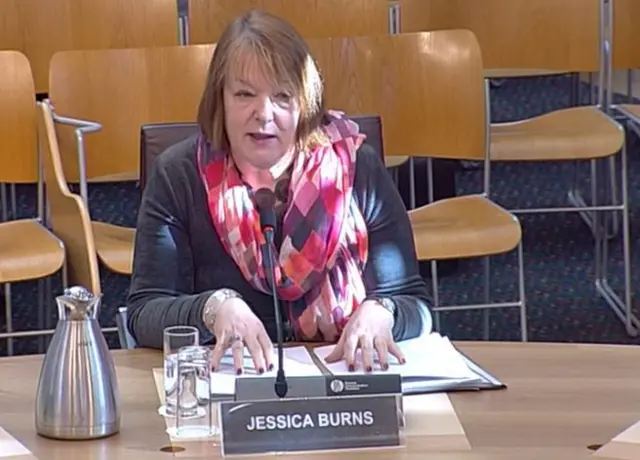
Jessica Burns is a regional tribunal judge
Convener Clare Adamson opens with a question on general concerns about the regulations.
Regional tribunal judge Jessica Burns suggests that the desire to make things better has led the proposed rules to be "more prescriptive" than they need to be.
She worries this could lead to some confusion when tribunals hear about both reserved and devolved aspects of welfare law in the future.
"That just seems disproportionate, confusing and perhaps not in the interests of any of the users of any appeals system."
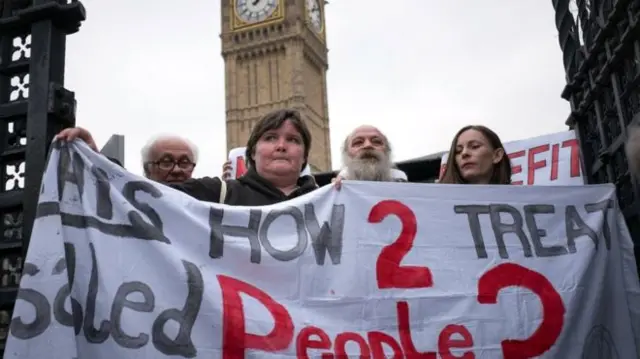 Image source, PA
Image source, PAEvery person receiving Personal Independence Payments (PIP) is to have their claim reviewed.
This follows a decision by the Department for Work and Pensions not to challenge a court ruling saying changes to PIP - which limited the support received by people with mental health conditions - were unfair.
Three people tell us about the issues they have faced when claiming PIP.
Allow X content?
This article contains content provided by X. We ask for your permission before anything is loaded, as they may be using cookies and other technologies. You may want to read X’s cookie policy, external and privacy policy, external before accepting. To view this content choose ‘accept and continue’.